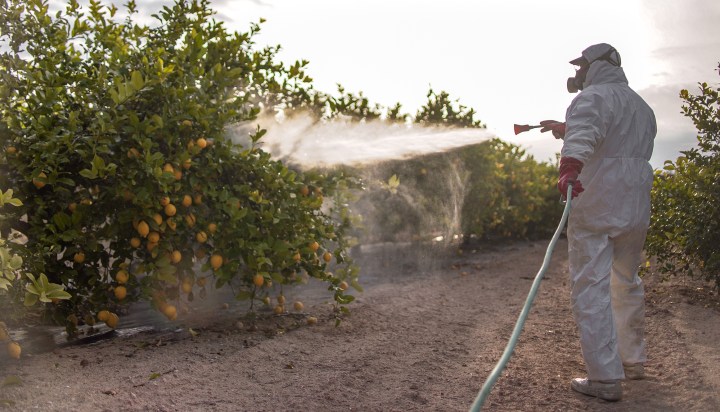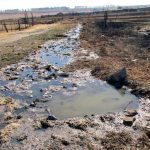TOXIC INC
UN representative calls on SA to move beyond harmful apartheid pesticide laws

A special mission to South Africa by the United Nations Special Rapporteur on Toxics and Human Rights has expressed deep concern for the continuing legacy of environmental racism that has left negative impacts on the health and environments of socially and economically vulnerable people.
Laws predating 1994 – before South Africa’s democracy – continue to stand in the way of the country banning hazardous pesticides that have had a harmful effect on the environment and people’s health, with some going as far as impeding human rights.
This is according to the United Nations Special Rapporteur on Toxics and Human Rights, Marcos A Orellana, who was speaking at a press briefing on Friday 11 August, as his mission in South Africa came to an end.
The special rapporteur found several environmental discrepancies that showed a continuing legacy of pre-1994 environmental racism. He touched on several sectors, including mining, the Just Energy Transition and waste management.
Among these legacies is the impact of the continued use of hazardous pesticides on people’s health, the environment and the crops being sprayed. Orellana said he had visited women farmers in the Western Cape who had expressed health concerns and seen the effects of new hazardous pesticides being used in the country.
South Africa has previously supported a proposal to amend the Rotterdam Convention on the Prior Informed Consent Procedure for Certain Hazardous Chemicals and Pesticides in International Trade. However, the country is yet to become a signatory to the Bamako Convention, which seeks to ban all hazardous substances on the African continent.
South Africa has ratified the Basel Ban Amendment, which prohibits the import of hazardous waste from members of the Organisation for Economic Cooperation and Development.
‘Legalised poisoning of workers’
“At the same time, there are laws dating from pre-1994 that are resulting in harms and human rights infringements. One example is the Hazardous Substance Act, No 15 of 1973. Similarly, the Fertilisers, Farm Seeds, Seeds and Remedies Act 36 of 1947 is outdated, fragmented and allows the import of hazardous pesticides that are banned in their country of origin. This results in the legalised poisoning of agricultural workers in the fields and neighbouring communities,” Orellana said.
The special rapporteur said there was a challenge in getting particular substances banned or managed as the issue fell under several departments, but said he had been assured that a multistakeholder committee on chemicals management was coordinating efforts with civil society and industry to address the issue.
During the rapporteur’s special missions, he visited farms in the Western Cape, speaking to women farmers who expressed concern about hazardous pesticides used in agriculture and also being sold illegally to tackle rat and cockroach problems. The women also spoke of children being poisoned by, or having died from, eating, drinking or handling hazardous pesticides.
Read more in Daily Maverick: UPL bans Daily Maverick from Durban chemical fire community meeting – again
“Despite the scientific evidence on their harms and the fact that they cannot be safely used, many highly hazardous pesticides are still legal and in use in South Africa. In 2022, there were 34 reported cases of poisoning and five deaths in Gauteng caused by an organophosphate, likely Terbufos,” said Orellana.
“Paraquat is another example of a pesticide that is widely available and responsible for serious health impacts and deaths. These two pesticides, among many others, are banned in the European Union; yet they are still produced in European countries for export, particularly to developing countries. This practice reproduces long-standing racist and colonial patterns of exploitation,” he said.
In addition, by not publishing a list of registered pesticides, South Africa was keeping important, useful information from the public.
“The post-1994 government inherited an economic model that created a suite of toxic challenges. The toxic pollution undermined the realisation of the right to a healthy environment,” Orellana said.
“While there are no easy solutions to the current toxic challenges facing the country, the human rights to life, health and a healthy environment provide a moral compass for the design of effective and legitimate measures.” DM




















 Become an Insider
Become an Insider
What a pathetic article!!! Racist pesticides, really? So what has the current government done ion the past 30 years to ban toxic and harmful chemicals and pesticides? Really scrapping the bottom of the barrel here DM, thought you were above that!
SA has a deep and troubling history with this, and I suspect a big part of the problem is mega commercial farming, to produce mass produced grains, fruits & veg for our mega supermarket chains. Similar to the USA. South Africans eat commercial breakfast cereals, grain & maize products, deceptively ‘perfect’ fruits & veg that require washing & scrubbing before you can eat it, & let’s not forget our laced fruit juices & wine. I became very conscious of these intertwined systems when I got to live in Cyprus for a while & noticed the contrast. In Cyprus no fresh produce looks as good as in SA but it’s all from small farms where they control pests mainly with nets & covers. They tell you what farm each item comes from, the soil still sticks, & nothing has been sprayed. Yet it’s not even officially organic. They just don’t spray toxins. The EU is very strict, but on the 1000s of small farms it’s not necessary either. In SA I’ve had to stop drinking wine because it makes me flush & gives me recurring sinusitis & gut issues. In Cyprus I can drink any local wine, no problem. My rosacea, colon problems, hayfever etc disappear after two weeks. No wonder SA has such high & climbing colon cancer rates! Our food system is broken. And only the privileged & educated can opt for organic. Yet, the privileged are duped into thinking everything should be as perfect & engineered as in our fancy supermarkets. We need to stop this broken thinking so that we can stop this broken food system.
The EU banned list is not followed everywhere. In 2020 the USA for example used 150 million kg of products banned in the EU. Some people mumble that the EU list was in part informed by lobbying to have certain out-of-patent pesticides banned to make place for their in-patent pesticides…. It is also a bit schizophrenic to ban products that are manufactured in the EU but allow the same products to be marketed and sold globally.